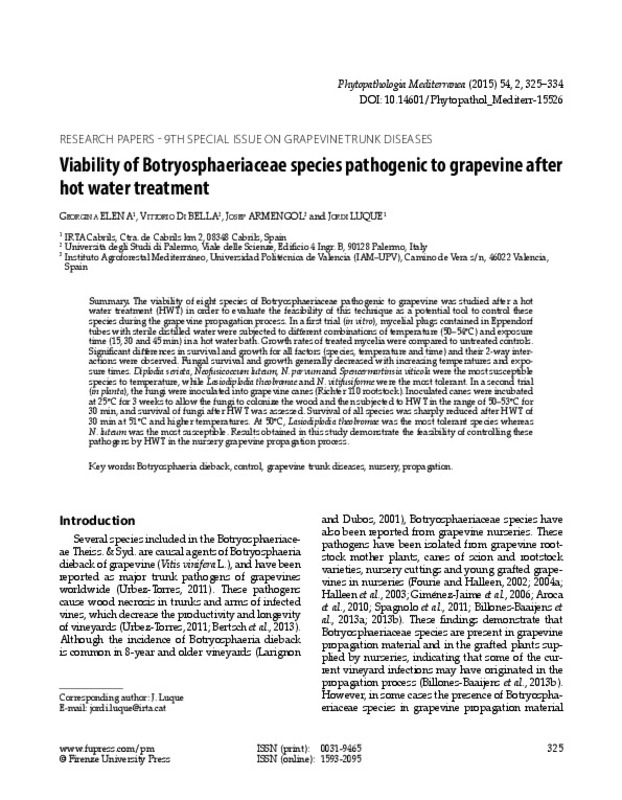JavaScript is disabled for your browser. Some features of this site may not work without it.
Buscar en RiuNet
Listar
Mi cuenta
Estadísticas
Ayuda RiuNet
Admin. UPV
Viability of Botryosphaeriaceae species pathogenic to grapevine after hot water treatment
Mostrar el registro sencillo del ítem
Ficheros en el ítem
| dc.contributor.author | Elena, Georgina
|
es_ES |
| dc.contributor.author | Di Bella, Vittorio
|
es_ES |
| dc.contributor.author | Armengol Fortí, Josep
|
es_ES |
| dc.contributor.author | Luque, Jordi
|
es_ES |
| dc.date.accessioned | 2016-09-02T07:31:00Z | |
| dc.date.available | 2016-09-02T07:31:00Z | |
| dc.date.issued | 2015 | |
| dc.identifier.issn | 0031-9465 | |
| dc.identifier.uri | http://hdl.handle.net/10251/68581 | |
| dc.description.abstract | [EN] The viability of eight species of Botryosphaeriaceae pathogenic to grapevine was studied after a hot water treatment (HWT) in order to evaluate the feasibility of this technique as a potential tool to control these species during the grapevine propagation process. In a first trial (in vitro), mycelial plugs contained in Eppendorf tubes with sterile distilled water were subjected to different combinations of temperature (50–54°C) and exposure time (15, 30 and 45 min) in a hot water bath. Growth rates of treated mycelia were compared to untreated controls. Significant differences in survival and growth for all factors (species, temperature and time) and their 2-way interactions were observed. Fungal survival and growth generally decreased with increasing temperatures and exposure times. Diplodia seriata, Neofusicoccum luteum, N. parvum and Spencermartinsia viticola were the most susceptible species to temperature, while Lasiodiplodia theobromae and N. vitifusiforme were the most tolerant. In a second trial (in planta), the fungi were inoculated into grapevine canes (Richter 110 rootstock). Inoculated canes were incubated at 25°C for 3 weeks to allow the fungi to colonize the wood and then subjected to HWT in the range of 50–53°C for 30 min, and survival of fungi after HWT was assessed. Survival of all species was sharply reduced after HWT of 30 min at 51°C and higher temperatures. At 50°C, Lasiodiplodia theobromae was the most tolerant species whereas N. luteum was the most susceptible. Results obtained in this study demonstrate the feasibility of controlling these pathogens by HWT in the nursery grapevine propagation process. | es_ES |
| dc.description.sponsorship | Dr A.J.L. Phillips (Universidade Nova de Lisboa, Portugal), Dr R. Raposo (INIA, Spain), and Prof Dr L. Mugnai (Università degli Study, Firenze, Italy) provided some of the isolates used in this study. This research was funded by the Spanish ‘Instituto Nacional de Investigación y Tecnología Agraria y Alimentaria’ (INIA), project RTA2010-00009-C03, with matching funds from the European Regional Development Fund (ERDF). Georgina Elena was supported by INIA with a predoctoral grant. | |
| dc.language | Inglés | es_ES |
| dc.publisher | Firenze University Press | es_ES |
| dc.relation.ispartof | Phytopathologia Mediterranea | es_ES |
| dc.rights | Reconocimiento (by) | es_ES |
| dc.subject | Botryosphaeria dieback | es_ES |
| dc.subject | Control | es_ES |
| dc.subject | Grapevine trunk diseases | es_ES |
| dc.subject | Nursery | es_ES |
| dc.subject | Propagation | es_ES |
| dc.subject.classification | PRODUCCION VEGETAL | es_ES |
| dc.title | Viability of Botryosphaeriaceae species pathogenic to grapevine after hot water treatment | es_ES |
| dc.type | Artículo | es_ES |
| dc.identifier.doi | 10.14601/Phytopathol_Mediterr-15526 | |
| dc.relation.projectID | info:eu-repo/grantAgreement/MICINN//RTA2010-00009-C03-01/ES/Biología y control de hongos patógenos causantes de enfermedades de madera de la vid en planta adulta/ | es_ES |
| dc.relation.projectID | info:eu-repo/grantAgreement/MICINN//RTA2010-00009-C03-03/ES/Calidad sanitaria de la planta de vid en vivero: caracterización, epidemiología y control de hongos asociados a las enfermedades de Petri y Pie negro/ | es_ES |
| dc.rights.accessRights | Abierto | es_ES |
| dc.contributor.affiliation | Universitat Politècnica de València. Escuela Técnica Superior de Ingeniería Agronómica y del Medio Natural - Escola Tècnica Superior d'Enginyeria Agronòmica i del Medi Natural | es_ES |
| dc.description.bibliographicCitation | Elena, G.; Di Bella, V.; Armengol Fortí, J.; Luque, J. (2015). Viability of Botryosphaeriaceae species pathogenic to grapevine after hot water treatment. Phytopathologia Mediterranea. 54(2):325-334. https://doi.org/10.14601/Phytopathol_Mediterr-15526 | es_ES |
| dc.description.accrualMethod | S | es_ES |
| dc.relation.publisherversion | http://dx.doi.org/10.14601/Phytopathol_Mediterr-15526 | es_ES |
| dc.description.upvformatpinicio | 325 | es_ES |
| dc.description.upvformatpfin | 334 | es_ES |
| dc.type.version | info:eu-repo/semantics/publishedVersion | es_ES |
| dc.description.volume | 54 | es_ES |
| dc.description.issue | 2 | es_ES |
| dc.relation.senia | 293171 | es_ES |
| dc.identifier.eissn | 1593-2095 | |
| dc.contributor.funder | Ministerio de Ciencia e Innovación |








